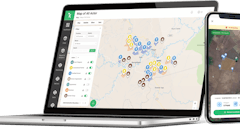The U.S. Department of Agriculture's National Institute of Food and Agriculture awarded five grants last week to support research, education and extension programs that will improve the competitiveness of organic livestock and crop producers.
"The organic industry is a rapidly growing segment of American agriculture and it is important we continue to invest in sound science to support organic producers," said USDA Secretary Tom Vilsack. "The discoveries these grants enable can help farmers who are looking to adopt the best organic practices that will make their operations more competitive and sustainable."
The grants disbursed include more than $3 million through the Organic Transitions Program (ORG). ORG is an essential part of USDA's commitment to the organic farm sector. USDA's flagship program to fund organic production, the Organic Agriculture Research and Extension Initiative (OREI), currently remains unauthorized to continue until a new Farm Bill is passed by Congress.
This year's ORG awards include:
University of Florida, Gainesville, Fla., $675,719. This project focuses on developing sustainable wholefarm systems for organic pecan production in the Southeast.
Michigan State University, East Lansing, Mich., $464,482. This project will develop alternatives to antibiotics for fire blight control in organic crops.
University of Minnesota, Minneapolis, Minn., $718,225. This project will create a series of online, interactive educational modules with a focus on the fundamentals of organic agriculture and how to transition to organic farming.
University of Texas Pan American. Edinburg, Texas, $746,973. This project focuses on launching an innovative new academic program that engages students in rigorous, well-designed research projects designed to address real-world problems faced by organic farmers in south Texas.
Washington State University, Pullman, Wash., $749,661. This project examines whether, over time, the adoption of organic farming improves natural pest control.
This year, NIFA also awarded $847,637 in continuation awards to previous ORG awardees. North Carolina State University's project seeking to understand the impact of organic systems in the Southeastern United States on greenhouse gas emissions and educate stakeholders and students about maximizing the mitigation potential of these systems received Fiscal Year 2013 continuation funding. Also receiving an award that will allow them to build on prior research accomplishments is Texas AgriLife Research for their program to quantify the effects of cover crops, organic soil amendments, and cultivar choice on rice yield, milling quality, soil quality, soil carbon sequestration, and greenhouse gas emissions.
In fiscal year 2013, ORG priorities included determining "ecosystem services", i.e., environmental benefits, provided by organic farming systems in the area of soil conservation and climate change mitigation, including reduction of greenhouse gases. In addition, ORG helps develop educational tools for Cooperative Extension personnel and other agricultural professionals who advise producers on organic practices. ORG also supports the organic industry to develop appropriate practices and materials to correspond with the National Organic Program's National List of Allowed and Prohibited Substances.
More information on the program may be found online HERE.




























